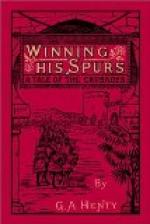The great mass of troops, however, were contented to sleep in the open air; indeed the difficulties of carriage were so great that it was only the leaders who could carry with them their canvas abodes. Before each tent stood the lance and colours of its owner, and side by side in the centre of the camp stood the royal pavilions of Phillip of France and Richard of England, round which could be seen the gonfalons of all the nobles of Western Europe.
Nothing could be gayer than the aspect of this camp as the party rode into it. They were rather late, and the great body of the host were already assembled.
Cuthbert gazed with delight at the varied colours, the gay dresses, the martial knights, and the air of discipline and order which reigned everywhere.
This was indeed war in its most picturesque form, a form which, as far as beauty is concerned, has been altogether altered, and indeed destroyed, by modern arms.
In those days individual prowess and bravery went for everything. A handful of armoured knights were a match for thousands of footmen, and battles were decided as much by the prowess and bravery of the leader and his immediate following as by that of the great mass of the army.
The earl had the day before sent on a messenger to state that he was coming, and as the party entered the camp they were met by a squire of the camp-marshal, who conducted them to the position allotted to them.
The earl’s tent was soon erected, with four or five grouped around it for his knights, one being set aside for his squires and pages.
When this was done, Cuthbert strolled away to look at the varied sights of the camp. A military officer in these days would be scandalized at the scenes which were going on, but the strict, hard military discipline of modern times was then absolutely unknown.
A camp was a moving town, and to it flocked the country people with their goods; smiths and armourers erected their forges; minstrels and troubadours flocked in to sing of former battles, and to raise the spirits of the soldiers by merry lays of love and war; simple countrymen and women came in to bring their presents of fowls or cakes to their friends in camp; knights rode to and fro on their gaily caparisoned horses through the crowd; the newly raised levies, in many cases composed of woodmen and peasants who had not in the course of their lives wandered a league from their birthplaces, gaped in unaffected wonder at the sights around them; while last, but by no means least, the maidens and good wives of the neighbourhood, fond then as now of brave men and gay dresses, thronged the streets of the camp, and joined in, and were the cause of, merry laughter and jest.




